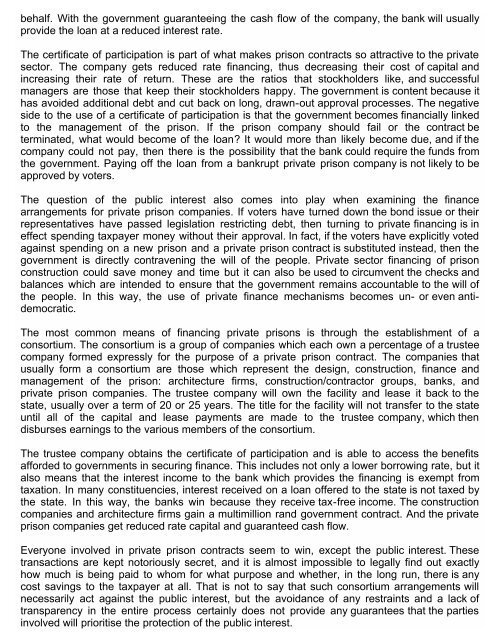prison privatisation in south africa issues, challenges and ...
prison privatisation in south africa issues, challenges and ...
prison privatisation in south africa issues, challenges and ...
You also want an ePaper? Increase the reach of your titles
YUMPU automatically turns print PDFs into web optimized ePapers that Google loves.
ehalf. With the government guarantee<strong>in</strong>g the cash flow of the company, the bank will usually<br />
provide the loan at a reduced <strong>in</strong>terest rate.<br />
The certificate of participation is part of what makes <strong>prison</strong> contracts so attractive to the private<br />
sector. The company gets reduced rate f<strong>in</strong>anc<strong>in</strong>g, thus decreas<strong>in</strong>g their cost of capital <strong>and</strong><br />
<strong>in</strong>creas<strong>in</strong>g their rate of return. These are the ratios that stockholders like, <strong>and</strong> successful<br />
managers are those that keep their stockholders happy. The government is content because it<br />
has avoided additional debt <strong>and</strong> cut back on long, drawn-out approval processes. The negative<br />
side to the use of a certificate of participation is that the government becomes f<strong>in</strong>ancially l<strong>in</strong>ked<br />
to the management of the <strong>prison</strong>. If the <strong>prison</strong> company should fail or the contract be<br />
term<strong>in</strong>ated, what would become of the loan? It would more than likely become due, <strong>and</strong> if the<br />
company could not pay, then there is the possibility that the bank could require the funds from<br />
the government. Pay<strong>in</strong>g off the loan from a bankrupt private <strong>prison</strong> company is not likely to be<br />
approved by voters.<br />
The question of the public <strong>in</strong>terest also comes <strong>in</strong>to play when exam<strong>in</strong><strong>in</strong>g the f<strong>in</strong>ance<br />
arrangements for private <strong>prison</strong> companies. If voters have turned down the bond issue or their<br />
representatives have passed legislation restrict<strong>in</strong>g debt, then turn<strong>in</strong>g to private f<strong>in</strong>anc<strong>in</strong>g is <strong>in</strong><br />
effect spend<strong>in</strong>g taxpayer money without their approval. In fact, if the voters have explicitly voted<br />
aga<strong>in</strong>st spend<strong>in</strong>g on a new <strong>prison</strong> <strong>and</strong> a private <strong>prison</strong> contract is substituted <strong>in</strong>stead, then the<br />
government is directly contraven<strong>in</strong>g the will of the people. Private sector f<strong>in</strong>anc<strong>in</strong>g of <strong>prison</strong><br />
construction could save money <strong>and</strong> time but it can also be used to circumvent the checks <strong>and</strong><br />
balances which are <strong>in</strong>tended to ensure that the government rema<strong>in</strong>s accountable to the will of<br />
the people. In this way, the use of private f<strong>in</strong>ance mechanisms becomes un- or even antidemocratic.<br />
The most common means of f<strong>in</strong>anc<strong>in</strong>g private <strong>prison</strong>s is through the establishment of a<br />
consortium. The consortium is a group of companies which each own a percentage of a trustee<br />
company formed expressly for the purpose of a private <strong>prison</strong> contract. The companies that<br />
usually form a consortium are those which represent the design, construction, f<strong>in</strong>ance <strong>and</strong><br />
management of the <strong>prison</strong>: architecture firms, construction/contractor groups, banks, <strong>and</strong><br />
private <strong>prison</strong> companies. The trustee company will own the facility <strong>and</strong> lease it back to the<br />
state, usually over a term of 20 or 25 years. The title for the facility will not transfer to the state<br />
until all of the capital <strong>and</strong> lease payments are made to the trustee company, which then<br />
disburses earn<strong>in</strong>gs to the various members of the consortium.<br />
The trustee company obta<strong>in</strong>s the certificate of participation <strong>and</strong> is able to access the benefits<br />
afforded to governments <strong>in</strong> secur<strong>in</strong>g f<strong>in</strong>ance. This <strong>in</strong>cludes not only a lower borrow<strong>in</strong>g rate, but it<br />
also means that the <strong>in</strong>terest <strong>in</strong>come to the bank which provides the f<strong>in</strong>anc<strong>in</strong>g is exempt from<br />
taxation. In many constituencies, <strong>in</strong>terest received on a loan offered to the state is not taxed by<br />
the state. In this way, the banks w<strong>in</strong> because they receive tax-free <strong>in</strong>come. The construction<br />
companies <strong>and</strong> architecture firms ga<strong>in</strong> a multimillion r<strong>and</strong> government contract. And the private<br />
<strong>prison</strong> companies get reduced rate capital <strong>and</strong> guaranteed cash flow.<br />
Everyone <strong>in</strong>volved <strong>in</strong> private <strong>prison</strong> contracts seem to w<strong>in</strong>, except the public <strong>in</strong>terest. These<br />
transactions are kept notoriously secret, <strong>and</strong> it is almost impossible to legally f<strong>in</strong>d out exactly<br />
how much is be<strong>in</strong>g paid to whom for what purpose <strong>and</strong> whether, <strong>in</strong> the long run, there is any<br />
cost sav<strong>in</strong>gs to the taxpayer at all. That is not to say that such consortium arrangements will<br />
necessarily act aga<strong>in</strong>st the public <strong>in</strong>terest, but the avoidance of any restra<strong>in</strong>ts <strong>and</strong> a lack of<br />
transparency <strong>in</strong> the entire process certa<strong>in</strong>ly does not provide any guarantees that the parties<br />
<strong>in</strong>volved will prioritise the protection of the public <strong>in</strong>terest.
















